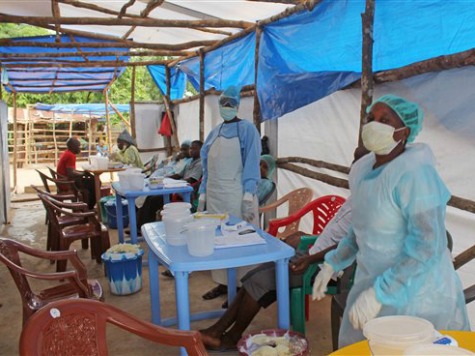
The deadly Ebola virus poses a threat to Britain, the Foreign Secretary has told the BBC. Phillip Hammond is so concerned about the outbreak, that has claimed 670 lives in Africa, he is to chair an emergency meeting today.
Although no Britons have been affected by the outbreak so far, the disease is known to be highly contagious and is spreading fast. A number of airlines have cancelled flights to Liberia and Sierra Leone because of concerns about the disease spreading to the countries.
The move came after an American man of Liberian descent developed the symptoms of Ebola on a flight from Liberia to Nigeria last week, raising the possibility that the disease has spread further than previously believed.
Ebola can have an incubation period of up to 21 days, and as a result, an outbreak might not be obvious straight away. The disease is also virtually incurable, with a survival rate of just a few percent.
In response to concerns about the spread of Ebola, Mr Hammond will chair a special meeting of COBRA (Cabinet Office Briefing Room A). The COBRA committee is a high level group that meets to discuss national emergencies and how the country could respond to them.
The Foreign Secretary said the government was “absolutely focused” on tackling the threat posed by the Ebola virus.
He said these included looking at “whether there are precautions we need to take – either in the UK or to protect our nationals in the area abroad.
“At the moment we don’t think any British nationals [abroad] are affected and we are fairly confident there are no cases in the UK. But it is a threat, it is something we need to respond to and we will be doing so through the Cobra mechanism.”
A Public Health England spokeswoman said an alert was sent to UK doctors on 1st July advising them to be aware of the symptoms of Ebola, especially in people who had recently returned from the region.
“Individuals who have sudden onset of symptoms such as fever, headache, sore throat and general malaise within 21 days of visiting affected areas should receive rapid medical attention, and be asked about potential risk factors and their recent travel,” it said.
It also went on to point out that there has never been an outbreak of Ebola in Europe. Health officials were also keen to stress that issuing medical alerts were a very common thing. There have been a number of warnings of flu epidemics, none of which eventually happened.
One man in Birmingham was suspected of suffering from Ebola but ultimately his tests came back negative.
A spokeswoman said protecting the public from infectious diseases was a priority and the UK “lead the world in this field”. She said: “We are well-prepared to identify and deal with any potential cases of Ebola, though there has never been a case in this country,” she said.
“Any patients with suspected symptoms can be diagnosed within 24 hours and they would also be isolated at a dedicated unit to keep the public safe. Our specialist staff are also working with the World Health Organisation to help tackle the outbreak in Africa.”
Dealing with risks of serious epidemics can be a tricky business for any government. The emergency services have to balance the need to minimise risk without frightening the public out of going about their everyday business.
Early this year Breitbart London reported that the British government has spent over £650m on Tamiflu in preparation for a flu epidemic. Not only did the epidemic not take place but there are also allegations that the drugs themselves were not an effective treatment.
This sort of “panic buying” of medication can prove to be a costly mistake.

COMMENTS
Please let us know if you're having issues with commenting.